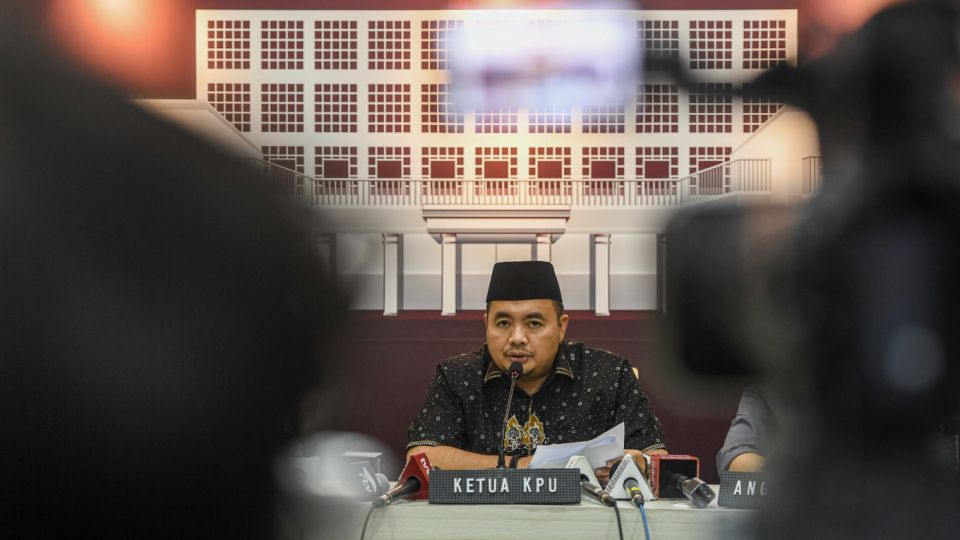August 26, 2024
JAKARTA – The House of Representatives has approved a new regulation on nomination requirements for the upcoming regional head elections that complies with a set of Constitutional Court rulings that legislators had previously sought to override.
In a consultation meeting on Sunday, the General Elections Commission (KPU) and lawmakers from House Commission II overseeing home affairs agreed on a revised version of the KPU election regulation that implemented a court-ordered lower nomination threshold and maintained the requirement that candidates be at least 30 years of age before their registration for the regional polls.
The meeting was initially scheduled for Monday, only a day before the three-day candidate registration window opens.
“Having the meeting on an earlier date gives more room for us to prepare the [registration] process,” KPU chairman Mochammad Afifuddin said.
Last week, lawmakers allied with President Joko “Jokowi” Widodo and his successor Prabowo Subianto rushed through legislation that sought to bypass two Constitutional Court rulings on nomination requirements for regional head elections in November.
The court’s rulings effectively precluded Jokowi’s youngest son Kaesang Pangarep from running this year and took steps to ensure more competitive races in November’s regional elections.
The power struggle between the House and the court triggered a wave of protests in multiple major cities last week, denouncing what protesters described as a move to ensure the influence of Jokowi’s political dynasty and prevent opposition figures from running in the November race.
“Hopefully, people will no longer have speculations, prejudices, and wrong preconceptions [about us]. And the new election regulation, which follows the two Constitutional Court decisions, can be promulgated immediately,” said House Commission II chairman Ahmad Doli Kurnia of the Golkar Party, a member of the pro-government coalition.
The KPU said the new regulation would be issued sometime on Sunday night.
Lingering suspicions
Some observers are concerned that lawmakers, the government or the KPU might still try to find a way to circumvent the rulings before candidate registration opens on Tuesday.
People across social media platforms over the weekend shared a screengrab of a mock-up of the state’s emergency alert screen and the hashtag #KawalPutusanMK to express concern over a possible constitutional crisis and call for a defense of the Constitutional Court’s decision.
The outcry was in response to differing draft versions of the election regulation that made rounds on social media, including one that stipulated that the age requirement would apply at the time of inauguration, not registration, in alignment with the House’s initial position and favoring Kaesang.
Various hashtags urging people to keep policymakers and the KPU in check until Tuesday remained trending topics on X on Sunday.
A smaller rally took place in front of the KPU’s national office in Jakarta on Sunday, spearheaded by the Labor Party, one of the petitioners in the nomination threshold case at the Constitutional Court. Protesters demanded that the KPU comply with the court’s decision.
Demonstrations were also held over the weekend in other major cities, such as Medan, Makassar and Surabaya, where protesters denounced Jokowi’s political dynasty and accused the outgoing leader and Prabowo of dragging the nation back into authoritarianism.
Speaking to The Jakarta Post on Saturday, KPU commissioner Idham Kholik denied social media speculation that the commission intended to impose age requirements that would allow Kaesang to run for public office in November.
As public discontentment over the House’s actions and political privileges for Jokowi’s family simmered on Saturday, the Indonesian Solidarity Party (PSI) announced that its chairman Kaesang would not run in the November election.
Also on Saturday, Jokowi denied speculation that he would issue a government regulation in lieu of law (Perppu) to overturn the court rulings, saying that his administration would comply with the court.
“There’s no such plan. It’s simply not on our agenda,” Jokowi told reporters on the sidelines of the national congress of the National Mandate Party (PAN), a member of both the pro-government coalition and Prabowo’s electoral alliance.
People power
The KPU’s new nomination regulation for the November polls was praised by civil society groups and election observers, who have repeatedly warned that disobeying the court’s decision would undermine the integrity of the November polls and put the nation on a path toward authoritarianism.
“This will only hurt us all, including the government, which has dedicated much cost, energy and time to holding November’s regional elections, as well as political parties, which will have their credibility increasingly degraded in the eyes of the public,” said Titi Anggraini, a professor of election law at the University of Indonesia.
If political elites insisted on maneuvering to bypass the rulings, constitutional law expert Feri Amsari said public resentment would intensify and “people power” would again be used to correct the situation.
“At times like this, a street parliament [social disobedience] is the most appropriate choice for the public to resist those who disobey the Constitution [which stipulates that a Constitutional Court ruling is final and binding],” Feri said. “Only in this way are the power holders forced to obey public sovereignty.”


